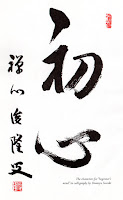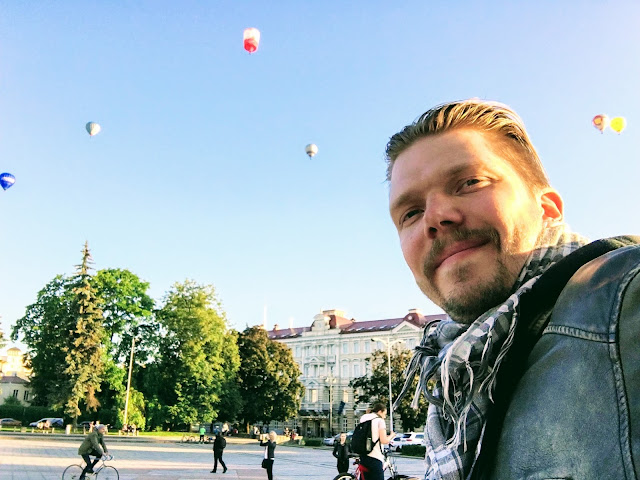The Natural Power Of The Beginner's Mind

“In the beginner’s mind there are many possibilities; in the expert’s mind there are few.” [1]
"It is our human nature to be active and the nature of every existence. As long as we are alive, we are always doing something. But as long as you think, “I am doing this,” or “I have to do this,” or “I must attain something special,” you are actually not doing anything.” [2]This is quite similar to the more modern approach of Zen-Buddhism called mindfulness and connects also very well to stoicism. Which got me thinking, that indeed thinking IS thinking and doing IS doing. So do we in everyday reality actually confuse these processes? Is it so, that we often don't move in the desired direction, because we practice one thing but neglect the other? We think, but don't act and we act without giving proper thought to what we are doing.
One thing at a time
As I understand, according to Zen-Buddhism one aspect on the way to be calm and connect with your true self is to be constantly in the moment doing one thing without the aim of achieving something. It seems that focusing and being able to be your best, your natural true self that is, is what is missing in the multitasking society we live in.To get to the point where my mind loses awareness of time and the non-relevant environment - my flow-state - I need to be able to really do the thing I'm doing. Get into it. Without interruption by myself or anybody else. I think that is why the beginner’s mind, the Zen mind matters. When I usually get to my flow-state, the zone where I do something for the sake of doing it, then I am truly focused and driven by my curiosity, excitement and the feeling that everything is as it should be. But it is the mind that is fresh and open that enables going into the moment first and it is the flow which lifts the eagerness of the beginner's attitude forward. A self-feeding cycle of learning maybe?
The idea is, that practicing what you do, may it be meditation, cooking, working, reading or eating, without doing other things in parallel, one discovers his true voice, her true handwriting or it's true style. It seems to me, that in this spirit the act of doing will connect more to your deeper self and make you therefore feel more fulfilled. Compared to switching between activities, I know that doing one thing at a time satisfies me definitely more than multitasking all over the place. But this is still not my prevailing way of doing things. And I think it is because I'm disconnected from my beginner's mind and rather connected with a kind of habitual mind, a mind addicted to information, a mind full of noise, a mind focused on the outcome rather than the process.
The wider audience of the beginner's mind
The undistracted beginner's mind is what I think enables calmness and happiness. The flow state is in simplified terms actually really only about allowing yourself and your mind to be undisturbed for a while and be curious about the task you are doing. The best thing is, that I believe this will eventually lead to providing value to others, too. By immersing yourself enough you will become more efficient in the things you do and thus start to provide more to those around you as well. The one who immerses themselves enough, but with a mind that is always ready, will make a bigger impact than the one who only strives to achieve to know everything.Enabling serendipitous circumstances
Now, we still live in a modern world. If you are reading this, then it is quite safe for me to say, that you are part of the 21st century. Which means information technology is all around.It may sometimes have the impact of creating a ripple in your mind, or a storm, IT sometimes wipes everything clean and at other times changes the landscape of your thought. But nonetheless we have a marvelous opportunity to guide and decide how technology affects us. We have the freedom of choice to use it to eliminate the unessential instead of letting it constantly add to everything.
What I mean by that particularly is, that if you are clear on your mission in a work setting, at school or even at home, that is (1.) know what is expected of you, (2.) why you should do what you need to do and (3.) believe that this way is currently the best known way to you to provide the most value to those who matter, then you can (4.) use technology to shut yourself out and (5.) get into the flow mentioned above.
There is a great post on tools and other nifty ideas by Steve Kamb on his blog at NerdFitness.com and some more tools recommended by Tim Ferriss that I have also found helpful on the FourHourWorkWeek blog. Which I definitely recommend to check out in order to let technology assist your natural self.
The thing to keep in mind though is that it's never only about technology nor only about the singular self. The problems we face as humans are still human problems - obstacles are exactly as we perceive them to be. Maybe the informed utilization of the symbiosis of man and machine is what will eventually help us stay in control of our old and modern ways. (If you have a nondeterministic world view and believe in free will that is.)
Just one mental model
I believe that everybody wants to be happy and that there are different ways to stay or get back there. One way may be to be mindful of the practice that you are doing in the moment you are doing it, try to always have an open and curious beginner's mind, be therefore more efficient and benefit others more while using technology to aid you at all this. Probably one way of at least 7.3 billion.There is another quite interesting approach in Zen-Buddhism - the notion of nondualism. "Our body and mind are not two and not one” says Suzuki [3]. And so this final idea is what I feel needs to send today's train of thought onward in the direction of the next unknown station: To think and to do are one and the same process, and they are not. The beginner's mind and the expert's mind are one, and they are not – not two, and not one.
***
In what way does the Zen approach make sense to you? How might one go about keeping and cultivating a constant beginner's mind? What tools or practices do you use to undistract yourself?
Please feel free to answer in the comments below.
Suzuki, S. (1979). Zen Mind, Beginner's Mind. (T. Dixon, Ed.). New York; Tokyo: Weatherhill.
[1] Page 21. [2] Page 47. [3] Page 25.



Comments
Post a Comment